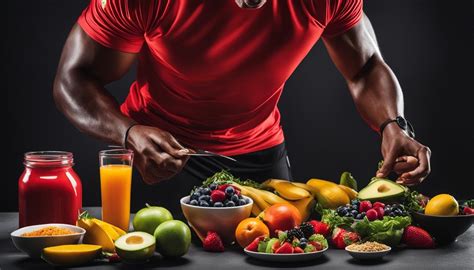The Demands of the Modern Man: Why Nutrition Matters More Than Ever
In today’s fast-paced world, busy men often juggle demanding careers, family responsibilities, and personal aspirations. While the drive to succeed is commendable, it often leaves little room for meticulous meal preparation. Yet, proper nutrition isn’t a luxury; it’s the foundational fuel that powers peak cognitive function, sustains energy levels through grueling days, and supports the physical recovery and growth necessary for muscle gains. Overlooking this critical aspect can lead to burnout, decreased productivity, and stalled fitness progress. This guide provides actionable strategies to optimize your daily nutrition, even when time is your scarcest commodity.

Foundational Principles for Peak Performance
Before diving into specific tactics, understanding the core tenets of effective nutrition is crucial. It’s not about complicated diets but consistent adherence to a few key principles:
- Macronutrient Balance: Protein, carbohydrates, and fats all play vital roles. Protein is essential for muscle repair and growth, satiety, and hormone production. Complex carbohydrates provide sustained energy for both brain and body. Healthy fats are crucial for hormone regulation, nutrient absorption, and brain health.
- Micronutrient Density: Vitamins and minerals found in fruits, vegetables, and whole grains are the unsung heroes, facilitating thousands of bodily processes, from energy production to immune function.
- Hydration: Often underestimated, adequate water intake is paramount for energy, focus, digestion, and virtually every physiological process. Dehydration can significantly impair cognitive and physical performance.
- Meal Timing & Frequency: While not as rigid as once thought, strategic timing of meals and snacks can help stabilize blood sugar, maintain energy, and optimize nutrient delivery for muscle recovery.
Streamlined Strategies for On-the-Go Fueling
Being busy doesn’t mean sacrificing nutritional quality. It means being smart and efficient:
Master the Art of Meal Prep
Dedicate a few hours one day a week (e.g., Sunday) to prepare components for multiple meals. Cook large batches of lean protein (chicken breast, ground turkey, fish), complex carbohydrates (quinoa, brown rice, sweet potatoes), and chop vegetables. Store them in individual containers for grab-and-go convenience.
Embrace Smart Snacking
Avoid the vending machine trap. Keep healthy, nutrient-dense snacks accessible. Think Greek yogurt, nuts, seeds, fruit, hard-boiled eggs, or protein bars with minimal added sugar. These prevent excessive hunger and provide steady energy between main meals.

Prioritize Whole, Unprocessed Foods
Focus on foods as close to their natural state as possible. These are typically richer in micronutrients and fiber and lower in inflammatory ingredients. Minimize packaged goods, sugary drinks, and fast food.
Simplified Meal Structures
Develop a few go-to healthy meal templates you can easily rotate. For example, a protein source + a complex carb + a large serving of vegetables. This simplifies decision-making and ensures nutritional consistency.
Fueling Specific Goals: Energy, Focus & Muscle
For Peak Energy & Focus
- Consistent Breakfast: Start your day with a balanced meal that includes protein and complex carbs (e.g., oatmeal with berries and protein powder, eggs with whole-wheat toast).
- Steady Intake: Avoid large gaps between meals that lead to energy crashes. Utilize smart snacks to maintain stable blood sugar.
- Healthy Fats: Incorporate sources like avocados, nuts, seeds, and olive oil to support brain health and sustained energy.
- Hydration is Key: Keep a water bottle handy and sip throughout the day. Consider adding electrolytes if your activity levels are high.
For Consistent Muscle Gains
- Adequate Protein Intake: Aim for 1.6-2.2 grams of protein per kilogram of body weight daily, distributed across 3-5 meals. This provides the amino acids needed for muscle repair and synthesis.
- Post-Workout Nutrition: Consume a meal or shake containing protein and carbohydrates within 1-2 hours after training to kickstart recovery and replenish glycogen stores.
- Caloric Surplus (if bulking): To gain muscle, you generally need to consume slightly more calories than you burn. Track your intake and adjust as needed.
- Prioritize Sleep: While not strictly nutrition, sleep is critical for hormone regulation and muscle recovery.

Your Daily Nutritional Playbook: Practical Tips for Implementation
Here’s how to integrate these strategies into your busy life:
- Plan Ahead: Look at your week. Identify your busiest days and plan simpler meals or prepped options for them.
- Smart Grocery Shopping: Make a list and stick to it. Focus on the perimeter of the grocery store where whole foods are typically found.
- Invest in Tools: A good set of meal prep containers, a reliable blender, and perhaps a slow cooker or instant pot can be game-changers for efficiency.
- Batch Cooking: Cook extra portions of dinner to serve as lunch the next day.
- Hydration Reminders: Use an app, set alarms, or simply keep water visible at all times.
- Listen to Your Body: Pay attention to how different foods make you feel. Adjust your diet based on your energy levels, digestion, and performance.

Conclusion: Sustainable Habits, Lasting Results
Optimizing nutrition for peak energy, focus, and muscle gains as a busy man isn’t about perfection; it’s about consistency and making smart, sustainable choices. By adopting efficient meal prep, prioritizing whole foods, and understanding the specific needs for your goals, you can unlock a new level of performance in all aspects of your life. Start small, build habits gradually, and watch as your physical and mental capabilities transform. Your body and mind are your most valuable assets – fuel them wisely.





